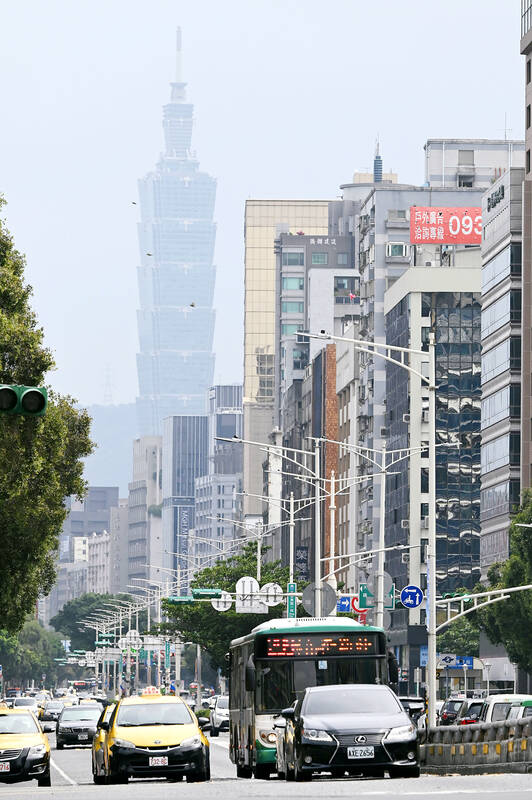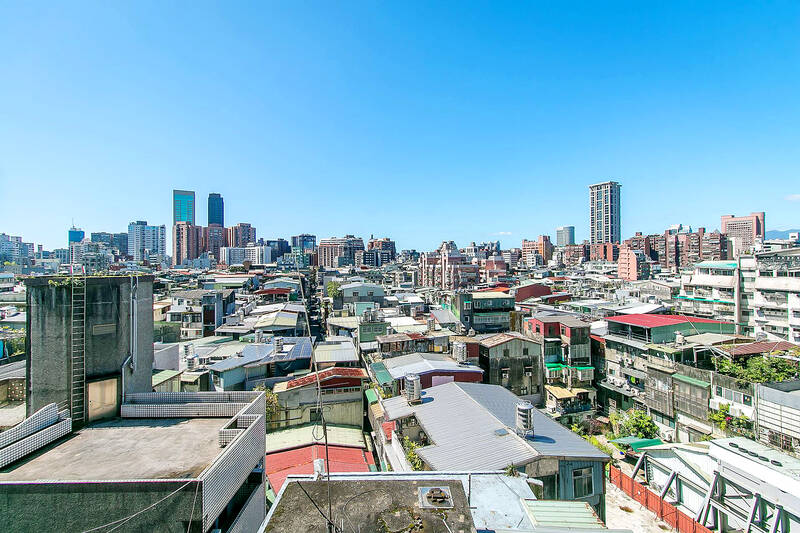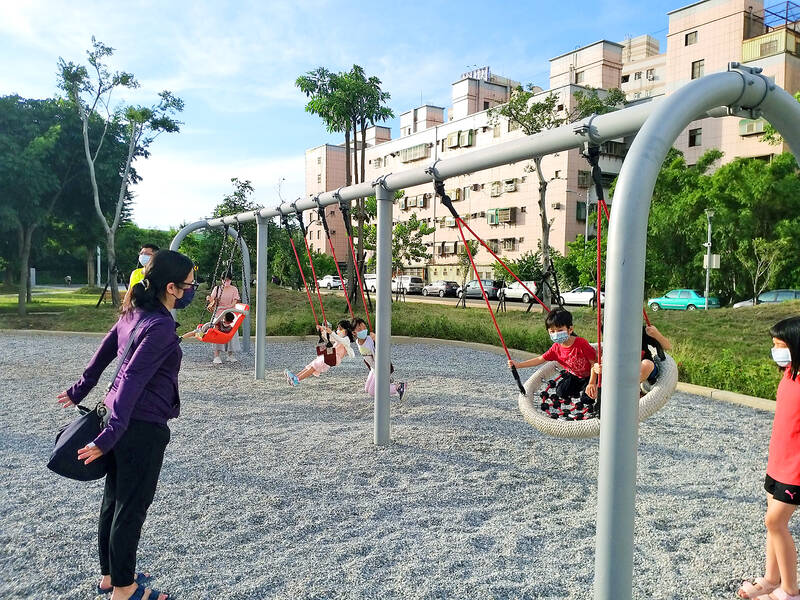A commentary in this paper the other day highlighted the wealth and large real estate holdings of Hon Hai Precision Industry Co founder Terry Gou (郭台銘), former Taipei mayor Ko Wen-je (柯文哲), New Taipei City Mayor Hou You-yi (侯友宜) and former legislator Huang Kuo-chang (黃國昌), all of whom yesterday attended a social housing rally in Taipei on Ketagalen Boulevard.
The hypocrisy of these leaders notwithstanding, social housing remains an issue for a party to grab and run with, as these men have sensed. Social housing as the creation of affordable homes for rent to low-income and disadvantaged groups came late to Taiwan, which is one reason the nation is so bad at it.
The first social housing act with the disadvantaged in mind came only in 2011 with the passage of a social housing act. Prior to that, such housing policies as existed had focused on producing units that people could purchase, though the government mostly did nothing as the housing bubble consumed the north.

Photo: George Tsorng, Taipei Times
FAILED POLICY
The 2011 law reserves 30 percent of units in social housing buildings for disadvantaged groups. The remaining 70 percent in most areas is reserved for people whose income is below the median income for that area. The government’s goal was to help both these groups.
Many Taiwanese who need a place to live don’t fall below the 50th percentile of income in their area. They cannot get any benefits from social housing. But because there is a massive shortage of social housing, new projects are subject to lotteries, meaning that the vast majority of applicants can’t get a place.

Photo courtesy of Yungching Realty
One of the ironies of Ko participating in a social housing march is the policies the Taiwan People’s Party (TPP) presidential candidate pursued while he was mayor. For example, late in 2020 the city informed applicants that they could move into the new Minglun Social Housing project, in Datong District (大同).
The rent for a three bedroom apartment in the project was NT$36,000 a month or more, close to the national median monthly income, and well above the median monthly income for service industry employees. Even with rent subsidies, the disadvantaged groups allegedly the target of such policies, could not afford a place in it.
According to an editorial in this paper, the project’s rents were set based on “the cost of construction, 55 years of management and operational costs, replacement costs, housing and land value taxes and other fees.” Even the land taxes were passed on to the renters. Social housing, the city decided, was more like a side business than an attempt at social justice, or even provision of housing where necessary service people could live in the city.

Photo: Liao Hsueh-ju, Taipei Times
Ko’s policies, and even more, his remarks on social housing should make him vulnerable to attacks by his opponents in the election. They should also scare off his younger followers. Far from maverick, Ko’s “vision” is simply the received wisdom of most males of his generation: he said that the city did not want social housing to accommodate just poor people, and that low-income households should not aim to live in three-bedroom apartments. Let them eat studios!
In Ko’s first term he promised that the city would create 50,000 social housing units, but in January of 2021, he admitted that this was a dream and at most 20,000 would be built. Similarly, the administration of Tsai Ing-wen (蔡英文) promised in 2016 that it would create 200,000 units, but by 2020 only 20,000 had been completed. Last January the government announced a policy to get hotels to convert their rooms for social housing.
The performance of Chinese Nationalist Party (KMT) presidential candidate Hou You-yi in New Taipei City, the nation’s largest by population, has been similarly underwhelming.
Last year Premier Su Tseng-chang (蘇貞昌) called on New Taipei City to expand its social housing program. According to central government data, with the goal of 33,000 housing units, the central and city governments together had reached 16,417 units either completed, under construction or whose bidding had been completed. However, while the central government had plans to add another 18,338 social housing units before the end of next year, the city government had 405 units planned.
The social housing issue is urgent not only because of the nation’s staggering housing prices, but because many units built during the housing boom of the 50s and 60s are reaching the end of their lives. These units are often without elevators and inhabited by the elderly. For example, in Taipei over 125,000 houses, over 13 percent of the city’s housing stock, date from this period. All will have to be rebuilt, an issue all three major party mayoral candidates spoke about during their campaigns last year.
STIGMA
Similar issues exist in all the nation’s major cities. This separate but related demand for housing implies that well-meaning estimates of the need for social housing are substantial underestimates. It also suggests a way to address an urgent problem of social housing: stigma.
Why is social housing construction moving so slowly? Ko attitudes toward social housing are hardly untypical. There is a deep stigma surrounding social housing and public opposition to it is visceral.
It is an excellent opportunity for a candidate to stand up and say that the people in need of social housing are not failures and criminals but grandmothers and service workers and students. Another reason social housing progress is slow is because it competes with other infrastructure projects and private construction for the nation’s supply of gravel. Taiwan houses are made of concrete. Yet they needn’t be.
For decades the US and Canada have been trying to get Taiwan to amend its fire codes, which the government constructed with every appearance of protecting its domestic concrete firms.
In fact, it is perfectly legal to build a house out of wood. However, the fire department often would not certify it as safe under the fire codes, meaning that owners could not insure it. There was also a long review process for wooden buildings. Hence, no one builds in wood.
For years the US has been begging Taiwan to change these rules. US representatives offered suggestions on product testing, new building codes, conducted trade missions and provided fire codes and testing specifications. Finally, in January of 2021 the government announced a revision to the building codes.
Seems that a candidate with a strong social housing policy that calls for greater use of wood, promotes social housing as an alternative for the elderly as well as the poor and addresses areas outside of the nation’s large cities would please important allies and scoop up votes, along with actually doing something for the country.
And start changing our gravel-driven, concrete-spewing construction-industrial state, which threatens to entomb Taiwan in cement.
Notes from Central Taiwan is a column written by long-term resident Michael Turton, who provides incisive commentary informed by three decades of living in and writing about his adoptive country. The views expressed here are his own.

Three big changes have transformed the landscape of Taiwan’s local patronage factions: Increasing Democratic Progressive Party (DPP) involvement, rising new factions and the Chinese Nationalist Party’s (KMT) significantly weakened control. GREEN FACTIONS It is said that “south of the Zhuoshui River (濁水溪), there is no blue-green divide,” meaning that from Yunlin County south there is no difference between KMT and DPP politicians. This is not always true, but there is more than a grain of truth to it. Traditionally, DPP factions are viewed as national entities, with their primary function to secure plum positions in the party and government. This is not unusual

Mongolian influencer Anudari Daarya looks effortlessly glamorous and carefree in her social media posts — but the classically trained pianist’s road to acceptance as a transgender artist has been anything but easy. She is one of a growing number of Mongolian LGBTQ youth challenging stereotypes and fighting for acceptance through media representation in the socially conservative country. LGBTQ Mongolians often hide their identities from their employers and colleagues for fear of discrimination, with a survey by the non-profit LGBT Centre Mongolia showing that only 20 percent of people felt comfortable coming out at work. Daarya, 25, said she has faced discrimination since she

More than 75 years after the publication of Nineteen Eighty-Four, the Orwellian phrase “Big Brother is watching you” has become so familiar to most of the Taiwanese public that even those who haven’t read the novel recognize it. That phrase has now been given a new look by amateur translator Tsiu Ing-sing (周盈成), who recently completed the first full Taiwanese translation of George Orwell’s dystopian classic. Tsiu — who completed the nearly 160,000-word project in his spare time over four years — said his goal was to “prove it possible” that foreign literature could be rendered in Taiwanese. The translation is part of

April 21 to April 27 Hsieh Er’s (謝娥) political fortunes were rising fast after she got out of jail and joined the Chinese Nationalist Party (KMT) in December 1945. Not only did she hold key positions in various committees, she was elected the only woman on the Taipei City Council and headed to Nanjing in 1946 as the sole Taiwanese female representative to the National Constituent Assembly. With the support of first lady Soong May-ling (宋美齡), she started the Taipei Women’s Association and Taiwan Provincial Women’s Association, where she